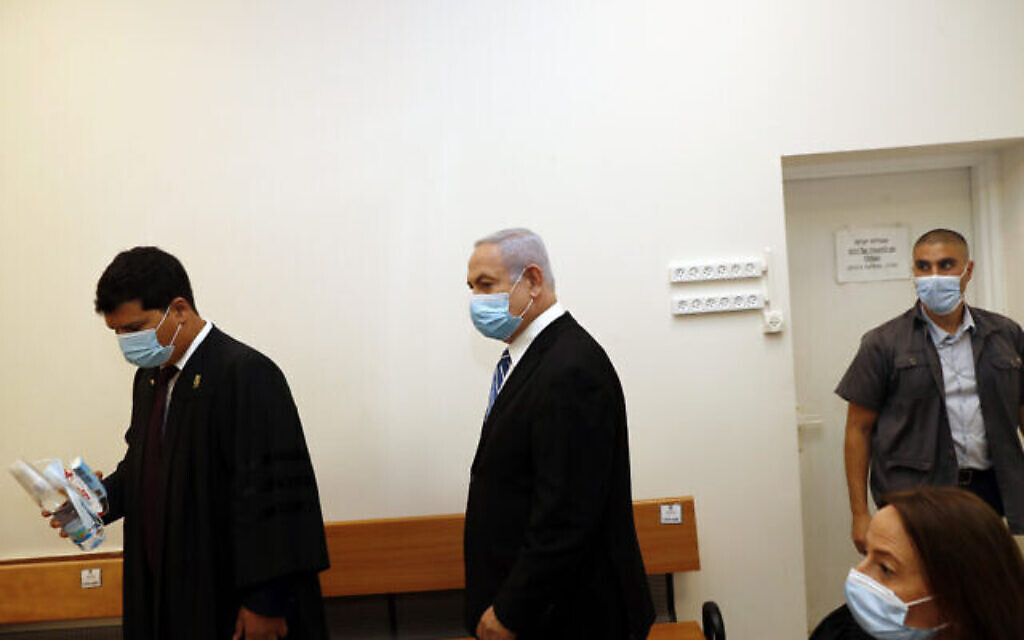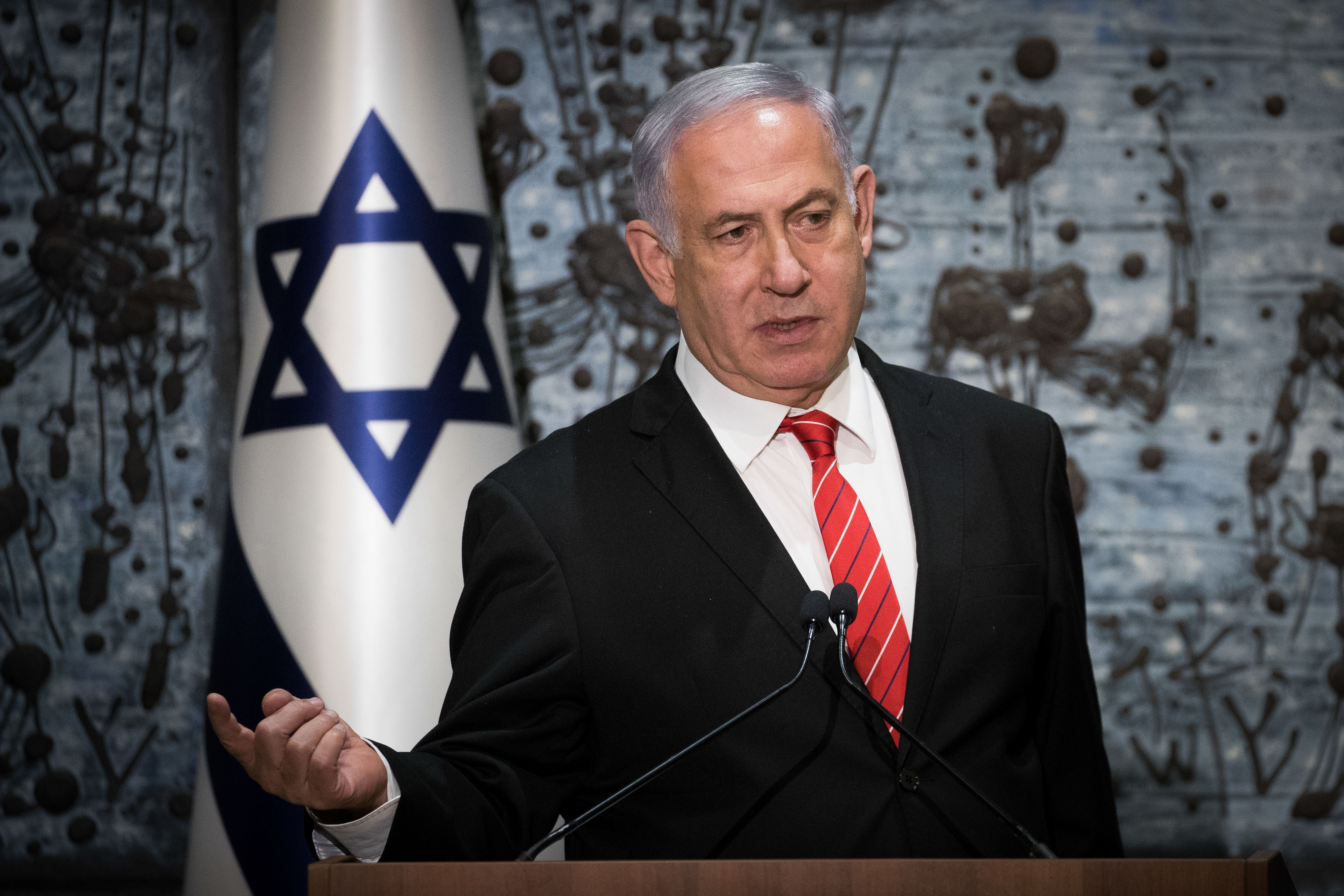ANALYSIS: As corruption trial starts, what next for Netanyahu’s election hopes?
Nathan Jeffay looks at the dramatic exit of Israel's Prime Minister from Monday's hearing, and how he may use the spotlight to his advantage

The street of the Jerusalem courthouse was thronged with protesters as Israel’s Prime Minister appeared in his corruption trial on Monday. He is battling for an acquittal from the judge — but more immediately, for the country to trust and reelect him.
Benjamin Netanyahu tried to project authority, as much as possible, by quitting the courtroom part-way through the hearing, sending out a message that far more important things need his attention. “Thank you very much,” he said before leaving, with permission.
His only notable contribution to the hearing was to formally deny the charges against him, reflecting his long-held position that he has done nothing wrong.
Get The Jewish News Daily Edition by email and never miss our top stories Free Sign Up
Even for Netanyahu, the resilient leader who is famous for turning lemons in to lemonade, it’s hard to put on a brave face as a trial against him gathers pace amid another election campaign. But surprisingly, it doesn’t look set to dampen his standing in the polls.
“Whatever damage this trial will do to him politically has already been done,” said criminal and constitutional law expert Dr. Amir Fuchs. “It doesn’t look like there will be more damage now.”
Fuchs, senior researcher at the Israel Democracy Institute, has been closely monitoring the three cases against Netanyahu, and their political fallout, since the first of the investigations started in December 2016.
He gave this interview shortly after Netanyahu’s brief court appearance on Monday, which was his second of the trial.
The situation is confusing, especially for people following from abroad. What will happen now?
A file now needs to be delivered to enable the questioning of witnesses, which will take 10 days, and there will then be a few weeks to prepare for the questioning. This means it could happen a little before the election, or just afterwards. I wouldn’t be surprised if the evidence starts after the election, and the reason wouldn’t be politics, but just the fact that trials run slowly.

Won’t images of Netanyahu going to court, or possibly even evidence being brought to light, negatively impact his election campaign?
No. It’s like the stock-market, when everyone knows something will happen and therefore the effect isn’t felt on the markets when it does. I don’t think people will change their minds on whether or not they would vote for Netanyahu because we’re at a certain stage in the trial. Yes, maybe some people changed their mind about him based on the legal cases a year or two ago, but not now.
Have we already seen this dynamic in action?
Yes. We were surprised that nothing happened regarding Netanyahu’s popularity when the indictment was issued and other steps were taken. Maybe something would happen to public opinion if he is convicted, but this won’t be any time soon. The fact this trial is moving along as we prepare for an election won’t change anything politically.
Despite this, there are strong suggestions that the story of the trial and the story of the election are closely tied. Can you explain this purported link?
The trial won’t change the outcome of the election, but politics is very, very, relevant for the future of the trial. If Netanyahu has 61 out of 120 Knesset members who support him, he could change immunity rules, for example with a retroactive law saying a Prime Minister can’t go to trial, or a change to the way that Israel’s attorney general is appointed, and then select someone for the job who would stop the trial. I believe that there would be enough public opposition that this wouldn’t happen, but it seems to be the intention. Netanyahu had a very comfortable government, and this is the only explanation for him going to elections again.

If Netanyahu did have support for measures that could give him immunity post-election, could this happen before a verdict in the trial?
The election is in March; the verdict in the trial will be at least a year from now. So there is certainly enough time. Israel doesn’t have a constitution, but it has Basic Laws, the closest alternative. These can be amended in one day, so changes that could confer immunity could be very quick.

Thank you for helping to make Jewish News the leading source of news and opinion for the UK Jewish community. Today we're asking for your invaluable help to continue putting our community first in everything we do.
For as little as £5 a month you can help sustain the vital work we do in celebrating and standing up for Jewish life in Britain.
Jewish News holds our community together and keeps us connected. Like a synagogue, it’s where people turn to feel part of something bigger. It also proudly shows the rest of Britain the vibrancy and rich culture of modern Jewish life.
You can make a quick and easy one-off or monthly contribution of £5, £10, £20 or any other sum you’re comfortable with.
100% of your donation will help us continue celebrating our community, in all its dynamic diversity...
Engaging
Being a community platform means so much more than producing a newspaper and website. One of our proudest roles is media partnering with our invaluable charities to amplify the outstanding work they do to help us all.
Celebrating
There’s no shortage of oys in the world but Jewish News takes every opportunity to celebrate the joys too, through projects like Night of Heroes, 40 Under 40 and other compelling countdowns that make the community kvell with pride.
Pioneering
In the first collaboration between media outlets from different faiths, Jewish News worked with British Muslim TV and Church Times to produce a list of young activists leading the way on interfaith understanding.
Campaigning
Royal Mail issued a stamp honouring Holocaust hero Sir Nicholas Winton after a Jewish News campaign attracted more than 100,000 backers. Jewish Newsalso produces special editions of the paper highlighting pressing issues including mental health and Holocaust remembrance.
Easy access
In an age when news is readily accessible, Jewish News provides high-quality content free online and offline, removing any financial barriers to connecting people.
Voice of our community to wider society
The Jewish News team regularly appears on TV, radio and on the pages of the national press to comment on stories about the Jewish community. Easy access to the paper on the streets of London also means Jewish News provides an invaluable window into the community for the country at large.
We hope you agree all this is worth preserving.
-
By Laurent Vaughan - Senior Associate (Bishop & Sewell Solicitors)
-
By Laurent Vaughan - Senior Associate (Bishop & Sewell Solicitors)
-
By Laurent Vaughan - Senior Associate (Bishop & Sewell Solicitors)
-
By Laurent Vaughan - Senior Associate (Bishop & Sewell Solicitors)






















